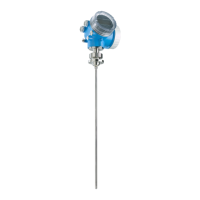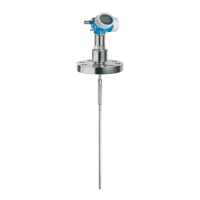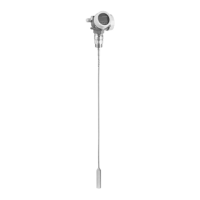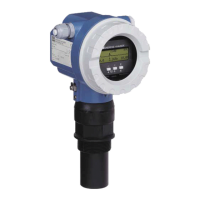7.3 Fault analysis
Table 7.2 lists the most common measuring errors with possible remedies. If the first
measure is successful, the remaining steps are not required.
Fault Analogue output Possible reason Remedy
Measured value incorrect
Distancw D (V0H8)
correct?
➀ Stilling well?
Check microwave factor,
see basic calibration, page 23
➁ False echo, see below
➂ Offset (V3H6) > 0?
Set to zero
Calibration /
Linearisation
correct?
➀ Check E (V0H1) and F (V0H2),
if necessary re-enter application
parameter V0H3, page 35
or. simulation, page 39
4/20 mA settings
correct?
➀ Re-enter V0H5 and V0H6, page 28
➀
☎ Call Service!
Measured value remains
constant on emptying
(No warning E641)
Measured value jumps to
higher value when tank almost
empty
Measured value jumps
sporadically with constant
level but waves on surface
False echoes from
fittings/nozzle
➀ False echo suppression
see page 24
➁ Optimise alignment,
see page 36
Build-up on or near
the antenna causing
weak echoes
➀ Activate window suppression,
see page 38
➁ Carefully clean antenna
Signal weakened -
by waves – false
echo sometimes
stronger
➀ Select application parameter 1/2
(V0H3), page 22, 23
➁ Activate window suppression,
page 38
➂ Increase output damping, page 28
➃ Active false echo suppression,
page 24
➄ Optimise alignment, page 36 or .
check mounting position,
page 9 - 11
if possible, select better position
➅
☎ Call Service!
20 mA
F m/ft
E m/ft
D m/ft (V0H8)
4mA t →
expected
happened
no
yes
no
yes
no
yes
20 mA
4mA t →
expected
happened
20 mA
4mA t →
expected
happened
20 mA
4mA t →
happened
expected
yes
no
yes
no
yes
Micropilot FMR 231 Chapter 7 Trouble-Shooting
Endress+Hauser 37
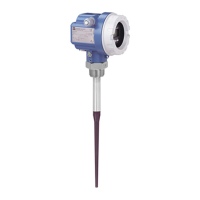
